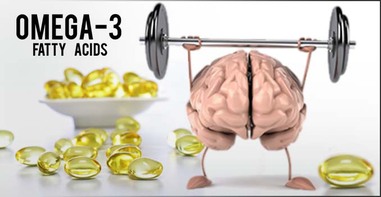
Omega-3’s in Addiction/Recovery
It is common for addicts to become malnourished as a result of their continued addiction and lack of self-care, which has a detrimental affect on their mood and behaviors. It is hypothesized that this state may catalyze and perpetuate their addictions. Researchers at University of Pittsburgh found that generational deficits of omega-3 within families can produce more mental health problems in children/teenagers, making them more susceptible to addiction. Second-generation rats with omega-3 deficiencies showed higher rates of anxiety and hyperactivity, learned at a slower rate, and had impaired problem-solving skills (Bondi et al., 2013), meaning that some adolescents may be pre-disposed to addiction because of their omega-3 deficiency.
Addiction is often referred to as a means of self-harm, or “slow suicide.” Research on suicide prevention has indicated that low omega-3 levels are associated with higher rates of self-harm, depression, and impulsivity (Garland et al., 2007). Others also found that low concentrations of DHA are linked with 62 % higher suicide risk (Xie & Innis, 2009). Dr. Hibbeln notes that low levels of omega-3s deplete the amount of dopamine that is available in the brain. Dopamine is involved in all things pleasurable, including getting high. When dopamine is low, it can “cause addicts to seek more and more drugs to get high, worsening their addiction,” says Hibbeln.

Omega-3’s are long-chain fats that are found in different foods, like salmon, sardines, avocado, olive oil, and walnuts. These are the foods with “good fat,” meaning it is the fat that helps feed the fatty tissue in your body that actually needs fat, like your brain and eyes. Have you ever noticed after going on a very low fat diet that you just can’t think as well as you used to? You go a little “diet dumb”? Or you become easily irritated? That is because by cutting out all fats, you are not getting the “good fats” that you actually need to function effectively.
Omega-3’s come in two main versions: DHA and EPA. In general, DHA is helpful in supporting brain and organ structures, such as helping neuron connections so that “everything is firing right.” EPA is related to stabilizing mood, especially as it relates to depression, bipolar disorder, and aggression. ALA is a type of plant-based omega-3 that is often added to foods to increase omega-3 content. It is not as potent as DHA or EPA, but it is still beneficial because the body converts it into DHA.

In our diets, omega-3’s compete with omega-6 fatty acids. Ideally, we would be consuming an equal ratio of omega-3’s to omega-6’s, but the average American diet consists of a 20:1 ratio, with omega-6’s beating out omega-3’s. This is due to the high amount of processed foods, animal meat, and omega-6-based oils that we consume on a daily basis. Knowing that addicts tend to neglect their diets even more than the average American makes it even more imperative that addicts add omega-3’s to their diets.
1. Change your diet: Eating a Mediterranean diet that is rich in vegetables and fruits, beans and olive oil, with the main protein coming from fatty fish and lean meats, will help to lower your omega-6’s and increase your omega-3’s.
2. Add supplements: Taking fish oil supplements is the easiest way to start getting omega-3’s into your diet. The recommended dosage depends on why you are taking them. For cognitive issues, just 200 mg of DHA can be helpful, whereas for supplementation to support depression and bipolar disorder, up to 2000mg of combined EPA and DHA have been used in research studies. Although fish oil has very few adverse side effects, it is important to check with a physician before adding fish oil to your diet. Talk to health food store employees about the best quality products, as the FDA does not regulate fish oil for quality assurance.
3. Check your oils: There is no difference between your brain and your car when it comes to having the right oil in your engine. Processed foods often have high omega-6 oils hidden in them, such as soybean oil. Soybean oil is often listed as vegetable oil (or part of a vegetable oil blend) on nutritional facts. In cooking, try to use olive oil, canola oil, or flaxseed oil, which are higher in omega-3 content. Even trading out high omega-6 oils for low omega-6 oils (high oleic-safflower and sunflower oils) can be helpful.
4. Find support: Changing your diet often involves changing large parts of your lifestyle, which can be very difficult. Find a health-conscious accountability partner to help you make the change, whether it is your spouse, a friend, or a therapist.
5. Get into therapy: Addiction involves much more than a simple diet deficiency, and is often accompanied by depression, anxiety, and mood regulation issues that might be better addressed with the help of a therapist. Therapists can also be good resources for providing the accountability you need to make big changes in your life, including your diet.
Please consult with your physician before making any major changes in your diet. Even though omega-3 fatty acids have several benefits, they are fats, and may be contraindicated for people with certain conditions. I am not a medically trained physician, and I offer this information only as review of the research literature and it’s stated applications of omega-3 fatty acids.

Dr. Voigt is a Clinical Psychologist who works with individuals, couples and families. She offers psychotherapy for people in recovery from substance addiction.
“If you want others to be happy, practice compassion. If you want to be happy, practice compassion.” – Dalai Lama XIV

 RSS Feed
RSS Feed